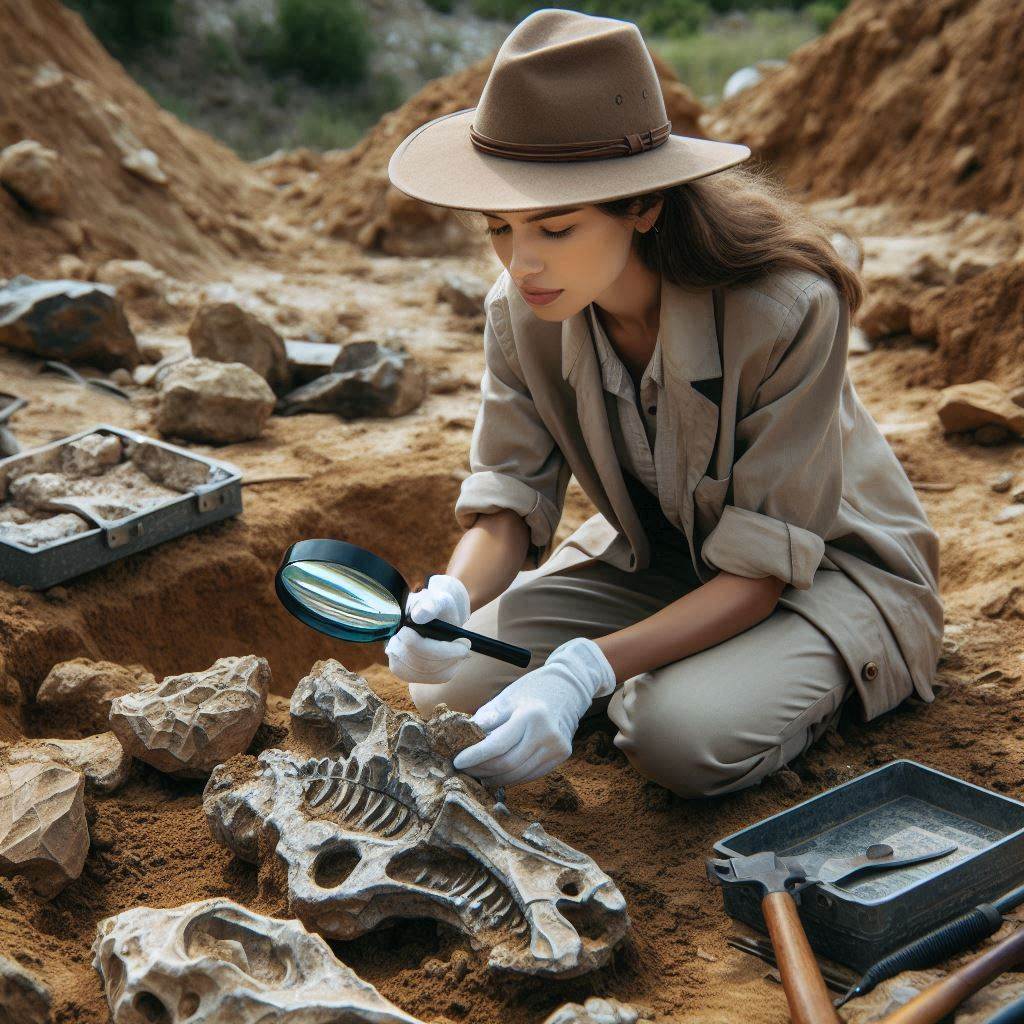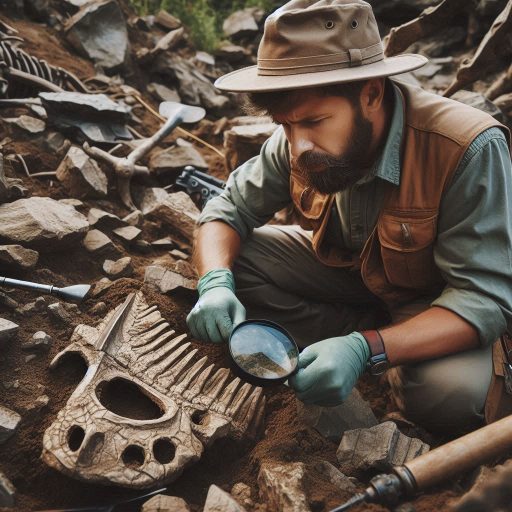Introduction
Paleontological societies and professional organizations play a vital role in the field of paleontology.
These organizations connect professionals, students, and enthusiasts, fostering collaboration and knowledge sharing across various disciplines.
They provide essential resources, including academic journals, conferences, and networking opportunities, that support both emerging and established paleontologists.
Membership in these societies enhances career development by offering access to cutting-edge research and educational materials.
Members can subscribe to scientific journals that feature the latest discoveries and methodologies in paleontology.
They often host workshops, field trips, and symposiums that promote scientific discussion and collaboration among peers.
Such events create a supportive environment where researchers can share findings, exchange ideas, and receive constructive feedback.
Additionally, these organizations advocate for the importance of paleontology in understanding Earth‘s history and biodiversity.
They engage in public outreach to raise awareness about paleontological discoveries and their implications for contemporary issues like climate change and conservation.
By promoting public interest, they inspire future generations to explore careers in paleontology and the sciences.
In this blog post, we will explore several key paleontological societies and their missions.
We will discuss the benefits of joining these organizations, including networking opportunities, mentorship programs, and access to exclusive publications.
What are Paleontological Societies
Define What Paleontological Societies Are
Paleontological societies are organizations dedicated to the study and promotion of paleontology.
They connect professionals, students, and enthusiasts interested in this fascinating field.
These societies focus on the study of fossils and ancient life forms.
Through collaboration and networking, they foster a sense of community among paleontologists.
The goal is to provide a platform for sharing research, discoveries, and techniques.
The Purpose of These Societies in Supporting Paleontologists
The primary purpose of paleontological societies is to support research and education in paleontology.
They promote the advancement of knowledge through conferences, workshops, and publications.
These organizations advocate for the importance of paleontology in scientific research and public awareness.
By raising awareness, they engage the public in understanding Earth‘s history.
Additionally, they encourage the preservation of fossil sites and heritage.
This advocacy helps protect valuable paleontological resources for future generations.
Benefits of Joining a Paleontological Society for Professionals in the Field
Joining a paleontological society offers numerous benefits for professionals in the field.
Membership provides access to valuable resources, including journals and newsletters.
These publications keep members informed about the latest research and developments.
Networking opportunities arise at meetings and events organized by the society.
Professionals can connect with other paleontologists, leading to collaborations and partnerships.
Members often enjoy reduced registration fees for conferences and workshops.
These events feature presentations from leading experts in the field.
Attending these gatherings enhances knowledge and skills through exposure to new ideas.
Members also have the chance to present their own research and findings.
This visibility can lead to career advancement and recognition in the community.
Many societies also offer mentorship programs for early-career paleontologists.
These programs connect seasoned professionals with students and young researchers.
Mentorship helps newcomers navigate the field and develop their careers.
Guidance from experienced mentors can lead to valuable connections and opportunities.
Paleontological societies often host outreach programs to engage the public.
These initiatives aim to inspire interest in paleontology among diverse audiences.
By collaborating with schools and community organizations, they enhance education about fossils and prehistoric life.
This outreach fosters a greater appreciation for the Earth‘s history and the importance of paleontology.
Role of Professional Organizations
Role of Professional Organizations in Paleontology
Professional organizations play a crucial role in advancing paleontology.
They provide resources, networking opportunities, and support for researchers, educators, and enthusiasts.
By fostering collaboration, these organizations promote the growth of knowledge and best practices in the field.
They create platforms for members to share research findings and discuss new ideas.
This exchange of information is vital for driving scientific progress.
Examples of Prominent Professional Organizations in the Field
One prominent organization is the Paleontological Society.
Founded in 1908, it serves as a leading authority in paleontological research and education.
The society publishes the journal Paleobiology, which features original research articles and reviews.
Members benefit from access to a wealth of knowledge that can enhance their work.
The society also hosts annual meetings, allowing professionals to connect and discuss their findings.
These gatherings foster collaboration and inspire future research projects.
Another notable organization is the Society of Vertebrate Paleontology (SVP).
Established in 1940, the SVP focuses on the study of vertebrate fossils.
It provides resources for researchers and educators to advance their understanding of vertebrate evolution.
The SVP also organizes annual meetings that draw professionals from around the world.
These meetings include presentations, workshops, and field trips, enriching the educational experience for attendees.
The International Paleontological Association (IPA) is another key player in the field.
It aims to promote the study of paleontology on a global scale.
The IPA organizes international congresses, enabling paleontologists to share their work across borders.
This collaboration fosters a deeper understanding of paleontological discoveries and their implications.
The organization also promotes educational outreach, helping to inspire future generations of scientists.
How These Organizations Support Research, Education, and Outreach Activities in Paleontology
Professional organizations support research initiatives by funding grants and scholarships.
They recognize the importance of nurturing young talent in the field.
Many organizations offer funding for research projects, allowing scientists to explore new ideas.
By supporting these initiatives, they help advance our understanding of the history of life on Earth.
Additionally, these organizations play a significant role in education.
They provide resources and training for teachers, enhancing paleontological curricula in schools.
Many organizations offer workshops, webinars, and online resources to support educators.
This investment in education helps foster a new generation of paleontologists who are equipped with the necessary skills.
Outreach activities also form a crucial aspect of professional organizations’ missions.
They work to engage the public and raise awareness about paleontology.
Through events, lectures, and public programs, organizations promote understanding of paleontological research.
This outreach helps demystify the science and encourages public interest in the field.
Therefore, professional organizations significantly impact paleontology.
They support research, education, and outreach activities, driving advancements in the field.
Through their efforts, they ensure the continued growth and appreciation of paleontology in society.
Read: Continuous Learning: Post-graduate Options for US Biologists
Membership Benefits
Benefits of Joining Paleontological Societies and Professional Organizations
Joining paleontological societies and professional organizations offers numerous benefits for individuals passionate about paleontology.
These groups provide a platform for members to connect with like-minded individuals.
Members can share knowledge and experiences, enriching their understanding of the field.
Furthermore, being part of such organizations enhances your professional credibility.
Employers often value candidates who actively engage in their professional communities.
Networking Opportunities Within These Organizations
Networking opportunities abound within these organizations, allowing members to form valuable professional relationships.
Paleontological societies often host annual conferences that gather experts from around the globe.
Attending these conferences allows members to present their research, share ideas, and learn from others.
Networking at these events can lead to collaboration on research projects or job opportunities.
Meeting professionals in the field helps you gain insights into current trends and advancements in paleontology.
Networking is not limited to formal events.
Many organizations provide online forums where members can interact.
These forums encourage collaboration and discussion, allowing members to seek advice and share experiences.
This accessibility fosters a sense of community among paleontologists, helping individuals feel connected despite geographical distances.
Members can easily reach out to others in their field and build meaningful relationships that enhance their careers.
Resources and Support Available to Members, Such as Access to Journals, Conferences, and Workshops
Members of paleontological societies gain access to valuable resources, including academic journals and publications.
These resources keep members informed about the latest research and discoveries in the field.
Access to these materials enhances your knowledge and helps you stay competitive in the job market.
Many organizations also offer online platforms where members can discuss recent findings and share ideas.
Professional organizations frequently offer workshops and seminars that enhance members’ skills and knowledge.
These educational opportunities cover various topics, from field techniques to the latest research methodologies.
Participating in these sessions expands your understanding of paleontology and sharpens your expertise.
Workshops often feature experts who provide practical insights you can apply in your work.
In addition to networking and resources, many organizations advocate for the interests of paleontologists.
They work to promote public understanding of paleontology and support policies benefiting the field.
By becoming a member, you contribute to these efforts and play a role in advancing the discipline.
Generally, joining paleontological societies and professional organizations provides numerous benefits.
From networking opportunities to access to essential resources, these organizations support personal and professional growth.
Embrace the opportunities these organizations offer and take your passion for paleontology to new heights.
Read: Biology Ethics: Navigating Complex Issues in the US
Research and Publications
How Paleontological Societies and Professional Organizations Promote Research in the Field
Paleontological societies and professional organizations play a vital role in promoting research within the field.
These organizations create platforms for researchers to share their findings, collaborate, and exchange ideas.
They organize conferences, workshops, and seminars that foster communication among paleontologists and related disciplines.
By facilitating networking opportunities, these societies help researchers form valuable connections that can lead to collaborative projects.
Many societies also offer grants and funding for research initiatives.
This financial support enables researchers to pursue ambitious projects that might otherwise lack funding.
Furthermore, these organizations often provide resources and tools that help enhance the research process.
For instance, access to specialized databases and archives allows paleontologists to find relevant literature quickly.
Role of These Organizations in Publishing Scientific Papers and Journals
Paleontological societies also play a critical role in publishing scientific papers and journals.
They typically have their own journals where members can submit their research for peer review.
This process ensures that published work meets high scientific standards.
By providing a venue for publication, these societies help researchers disseminate their findings to a broader audience.
The journals published by these organizations often become essential references in the field.
Researchers rely on these publications to stay updated on recent discoveries and methodologies.
Furthermore, many societies promote open access to their journals, making research more accessible to the public.
This approach benefits professionals and educates the general public about paleontological findings.
Significance of These Publications in Advancing Paleontological Knowledge
The significance of these publications in advancing paleontological knowledge cannot be overstated.
They serve as a record of scientific progress and contribute to the collective understanding of Earth‘s history.
Each published paper adds to the knowledge base, allowing future researchers to build upon existing work.
This cumulative knowledge helps refine hypotheses and shapes new avenues for research.
Additionally, the impact of these publications extends beyond the academic community.
They can influence conservation efforts, educational programs, and public interest in paleontology.
Increased awareness leads to greater appreciation for the discipline and its contributions to science.
This heightened interest can drive funding and resources for further research and exploration.
In summary, paleontological societies and professional organizations are pivotal in promoting research in the field.
Their role in publishing scientific papers enhances the visibility of paleontological findings.
These publications are crucial for advancing knowledge and fostering further exploration in the discipline.
By supporting researchers, these organizations help ensure that paleontology continues to thrive and evolve.
Their efforts shape the future of the field, benefiting scientists and the public alike.
Read: How to Become a Licensed Chemist in the USA: Steps and Tips

Gain More Insights: What Do Astronomers Do? A Day in the Life
Transform Your Career Today
Unlock a personalized career strategy that drives real results. Get tailored advice and a roadmap designed just for you.
Start NowEducation and Outreach
Educational Initiatives Undertaken by Paleontological Societies and Professional Organizations
Paleontological societies and professional organizations play a crucial role in education.
They develop various educational initiatives that cater to different audiences.
These initiatives include workshops, lectures, and online resources.
They aim to enhance the public’s understanding of paleontology.
Organizations such as the Society of Vertebrate Paleontology (SVP) and the Paleontological Society (PS) are at the forefront of these efforts.
One significant initiative is the creation of educational materials.
Many societies produce lesson plans and activity guides for teachers.
These materials help educators incorporate paleontology into their curricula.
They also provide students with engaging content.
Through these resources, students can learn about dinosaurs, fossils, and ancient ecosystems.
This approach fosters a love for science and critical thinking skills.
Furthermore, paleontological organizations often host conferences and symposiums.
These events offer professional development opportunities for educators.
Attendees gain access to the latest research and teaching strategies.
They can network with experts in the field and share best practices.
This collaboration strengthens the educational landscape in paleontology.
How These Organizations Promote Public Awareness and Understanding of Paleontology
Public awareness and understanding of paleontology receive significant attention from these organizations.
They actively engage the community through outreach programs.
For example, many societies host public lectures and family days at museums.
These events allow the public to interact with scientists.
They can ask questions and participate in hands-on activities.
Such experiences demystify paleontology and encourage interest in the field.
In addition, many paleontological organizations run volunteer programs.
These programs invite community members to assist in research projects.
Volunteers often participate in fieldwork and fossil preparation.
They learn practical skills while contributing to valuable scientific research.
This hands-on experience deepens their appreciation for paleontology.
Outreach Programs Aimed at Engaging Students, Educators, and the General Public
Outreach efforts specifically target students and educators.
Organizations often visit schools to give presentations.
These presentations cover topics like fossil identification and dinosaur anatomy.
They aim to spark curiosity in young minds.
Additionally, many organizations collaborate with educational institutions to host field trips.
Students can explore local fossil sites or attend workshops led by professionals.
Moreover, organizations utilize social media and online platforms.
They share educational content and news related to paleontology.
These platforms allow for broader engagement with diverse audiences.
Through blogs, videos, and interactive posts, they make learning accessible.
The digital age has expanded the reach of paleontological education.
In general, paleontological societies and professional organizations significantly impact education.
Their initiatives promote public awareness and understanding of paleontology.
Through outreach programs, they engage students, educators, and the general public.
By fostering a passion for this science, they inspire future generations of paleontologists.
Their work is essential for the continued growth of the field.
Read: Top Chemistry Departments and Schools in the US
Professional Development
How Paleontological Societies and Professional Organizations Support the Professional Development of Members
Paleontological societies and professional organizations play a crucial role in advancing their members’ careers.
They provide a platform for networking, education, and mentorship.
Members gain access to invaluable resources that enhance their professional growth.
Through workshops, seminars, and conferences, these organizations facilitate continuing education.
This engagement fosters an environment conducive to career advancement and skill enhancement.
Opportunities for Continuing Education, Training, and Mentorship
Many societies offer specialized training programs tailored to various aspects of paleontology.
These programs cover topics like field techniques, fossil preparation, and data analysis.
Members can attend hands-on workshops to gain practical skills.
They also benefit from lectures by leading experts in the field.
This exposure fosters a deeper understanding of paleontological concepts and methods.
Mentorship is another key component of professional development within these organizations.
Many societies connect experienced professionals with early-career paleontologists.
This relationship allows newcomers to receive guidance and insights from seasoned experts.
Mentors share their knowledge about navigating career paths and overcoming challenges.
Such interactions can significantly impact the growth and confidence of mentees.
These mentoring opportunities often lead to long-lasting professional relationships.
Highlight Career Resources and Job Opportunities Within the Paleontological Community
Paleontological societies also offer various resources to help members stay updated on industry trends.
They provide access to scholarly journals, newsletters, and online databases.
These resources keep members informed about the latest research and discoveries.
Staying current is essential for professional development and career advancement.
Job opportunities abound within the paleontological community, thanks to these organizations.
Many societies maintain job boards listing openings in academia, museums, and research institutions.
These platforms connect job seekers with potential employers.
Additionally, societies often collaborate with universities and research facilities, facilitating internships and research assistant positions.
Career development workshops are frequently organized by these societies.
These workshops focus on resume building, interview skills, and job search strategies.
Members learn how to effectively market their skills to potential employers.
By enhancing their job-seeking skills, members increase their chances of securing fulfilling positions.
Networking opportunities provided by paleontological societies are invaluable.
Members can connect with professionals from various sectors, including education, research, and conservation.
These connections often lead to collaborative projects and partnerships.
Attending conferences allows members to meet influential figures in the field.
Building these relationships can open doors to new opportunities and career advancements.
Furthermore, societies promote diversity and inclusion in the paleontological field.
Many organizations actively work to support underrepresented groups.
They provide scholarships, grants, and funding for research projects.
This commitment fosters a more inclusive community and enriches the discipline.
Explore Further: The Intersection of Meteorology and Data Science
Explore Further: Networking Tips for Aspiring Microbiologists
Conclusion
Paleontological societies and professional organizations play a crucial role in the field of paleontology.
These groups provide a platform for collaboration, networking, and continuing education.
Membership in these organizations offers access to resources such as journals, conferences, and workshops.
These opportunities allow paleontologists to stay current with the latest research and discoveries.
Professional organizations also provide a sense of community among paleontologists.
By connecting with peers, members can share knowledge, exchange ideas, and support one another in their research.
Additionally, these groups play a vital role in advocacy and public outreach.
By engaging with the public, paleontologists can raise awareness about the importance of their work and its impact on society.
In summary, paleontological societies and professional organizations are essential for the advancement of paleontology.
They facilitate collaboration, provide resources, support community building, and promote advocacy.
In closing, paleontological societies and professional organizations are vital for the field of paleontology.
Membership in these groups offers numerous benefits, including access to resources, networking opportunities, and professional development.
Therefore, I encourage readers interested in paleontology to get involved and join these organizations.
By becoming members, individuals can enhance their careers, stay informed about the latest research, and contribute to the advancement of the field.
Overall, paleontological societies and professional organizations are key players in the world of paleontology.
Their impact extends far beyond research, shaping the future of the field and fostering a strong community of paleontologists.
[E-Books for Sale]
The Big Book of 500 High-Paying Jobs in America: Unlock Your Earning Potential
$19.99 • 500 High-Paying Jobs • 330 pages
Explore 500 high-paying jobs in America and learn how to boost your career, earn more, and achieve success!
See All 500 High-Paying Jobs of this E-Book
1001 Professions Without a Degree: High-Paying American Jobs You Can Start Now
$19.99 • 1001 Professions Without a Degree • 174 pages
Discover 1001 high-paying jobs without a degree! Unlock career tips, skills, and success strategies for just $19.99!




